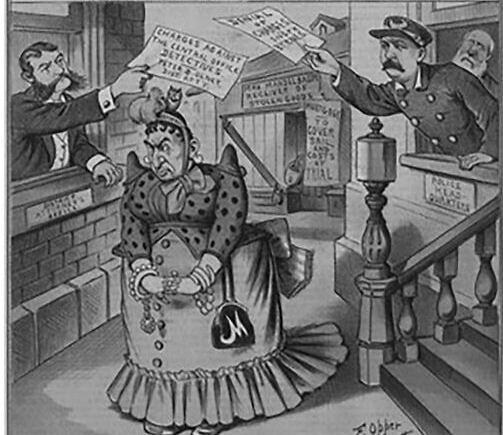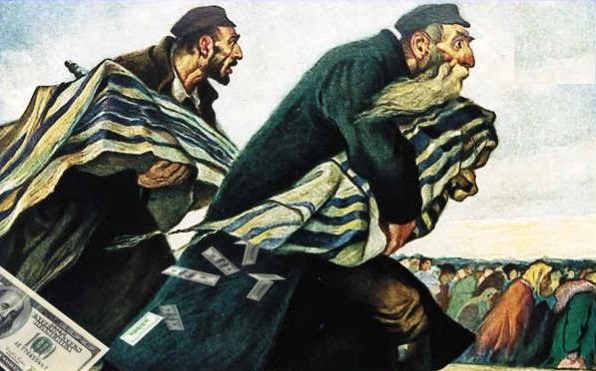Margalit Fox’s new book uncovers the fascinating life and capers of Fredericka Mandelbaum, who fenced stolen property and orchestrated complicated jewel heists and bank robberies
ed note–and remember, ladies and Gentile-men, whenever Jews are associated with criminal activity, it is because of ‘anti-Semitism’ , ‘tropes’ and ‘old canards’.
And for those deluded fools who will reflexively respond with the notion that she is not a ‘good Jew’ who followers her 10 Commandments, and in particular that ‘thou shalt not steal’ business, read it and weep for yourselves––
‘When the Lord your God brings you into the land, he will give you large, flourishing cities you did not build, houses filled with all kinds of good things you did not provide, wells you did not dig, and vineyards and olive groves you did not plant…’–Book of Deuteronomy
Times of Israel
America’s first major organized crime boss was a Jewish woman whose name almost no one knows today, Fredericka Mandelbaum, the subject of a new historical nonfiction book by Margalit Fox.

‘The Talented Mrs. Mandelbaum: The Rise and Fall of an American Organized-Crime Boss’ tells the fascinating story of an immigrant who traveled in steerage to the Lower East Side of Manhattan in 1850. After a decade of peddling lace and struggling to support her family, she transformed herself into a successful fence, someone who knowingly buys stolen property and sells it for a profit.
Between 1859 and 1884, Mandelbaum ran and grew her fencing operation from an unassuming storefront. It was the Gilded Age, a time when the emergent middle and professional classes were willing to turn a blind eye to the origins of coveted luxury items.
‘They quickly became consumers who were educated by the mass media of the day — catalogs, newspapers, magazines, and manuals of domestic advice aimed at women in particular, who were under real social pressure to have all of the best. They wanted fancy furniture, chintz, silk, doilies, and knickknacks in their home,’ Fox told The Times of Israel.
‘If you’re middle class rather than a Rockefeller, you need to look for bargains, and where do you look? You go to your friendly neighborhood receiver of stolen goods,’ she said.
Known by a slew of nicknames, including ‘Marm,’ Mandelbaum recruited a large cadre of loyal workers and associates, and advanced from fencing goods nabbed by pickpockets and shoplifters to orchestrating jewel heists and bank robberies in New York and beyond.
Mandelbaum was careful, but she did not stay in the shadows. The more notorious she became, the more she was mentioned or quoted in the newspapers. She was hard to miss, as she conspicuously flaunted her wealth. The very heavy, six-foot-tall Mandelbaum wore $40,000 worth of jewels at a time and dressed in silk, ostrich feathers, and sealskin.
Unfortunately for the crime boss, the jig was up when she was finally indicted in 1884 on several counts of grand larceny. She never stood trial, as she fled to Canada to avoid facing justice. For her, exile from her beloved New York until her death in 1894 seemed punishment enough.
The Times of Israel asked Fox about her impressions of Mandelbaum, what it was like piecing her life together when she left no personal papers, and how America’s first great crime boss differed from the ones of the 1920s and 1930s.
The Times of Israel: How did you initially learn of Fredericka Mandelbaum?
Margalit Fox: In a sense, she was always there for the taking. But like so many stories in women’s history, she was sort of glimmering below the surface, throwing off tiny sparks here and there. Many books about New York City history, and particularly books about crime in New York or 19th century New York, mention her in passing. She makes a couple of appearances, for instance, in ‘The Gangs of New York,’ by Herbert Asbury, which was the source material for the [2002 Martin] Scorsese film.
So I knew the name ‘Marm Mandelbaum,’ but little else, because there was little else out there. I wondered how this could be. We all think we know what a mob boss looks like. It’s Tony Soprano, or for those of us of a certain age, it’s a guy with spats and a Tommy gun from ‘The Untouchables.’ It’s a big, strapping guy — emphasis on guy — during Prohibition, most likely. Yet, 60-70 years earlier, there’s this big, zaftig, nice Jewish mother of four who has become the boss of the most notorious crime syndicate in America.
TOI–How did you go about researching her life?
Margalit Fox–Marm left no personal papers because she was no fool. She knew in her line of work, it would have been suicide. Of course, this was an immediate handicap for anyone like me who wanted to tell her story.
I knew that she existed, but no one was there to tell me how she got there. So I started a process that took a couple of years that was akin to a prospector panning for gold, where I sifted hundreds and hundreds of 19th-century newspaper articles, looking for her name. With both her first and last name spelled, re-spelled, and misspelled in all different ways, I had my work cut out for me, just making sure I found every reference to her. Eventually, I felt I had enough of these glimmers to put them together like a mosaic to create the woman and her story.
I also sifted through 19th-century court records and found her indictment on multiple counts of grand larceny from 1884. There was also an extremely useful Columbia University doctoral dissertation that a historian wrote about 15 years ago, which I cite a lot in my book.
TOI–You write in your book that Mandelbaum was the right woman in the right place at the right time to succeed as an organized crime boss. This was partially because the New York police force was in its infancy and in disarray. What else contributed to her success?
Margalit Fox–We know clearly that she was very bright, and even back in the Old Country in Kassel, Germany, Jewish girls were educated either at home or in the Hebrew day school.
Just as today, there were very few opportunities for safe, rewarding, meaningful jobs for new immigrants, and therefore, no opportunity for economic and social advancement. The men at least could climb what has been called ‘the crooked ladder’ by making careers in the underworld, running numbers racketeering, working as muscle, or aligning themselves with all of the corruption of Tammany Hall.
However, there were as few opportunities for women to advance up the crooked ladder as there were for them to advance in the world of legitimate enterprise. If you were a poor immigrant woman in the mid-19th century and you decided you were going to make it in illegal business, you had only two choices: shoplifting, or prostitution. Shoplifting was not that lucrative by its very nature. And we are safe to say that as a proper married woman and mother, for Mandelbaum prostitution was out of the question.
Mandelbaum was determined not to remain in poverty and had a decision to make. She had the smarts, the grit, and the determination to do it. She had enterprise and drive.
TOI–Mandelbaum was a criminal mastermind, yet she was a synagogue-goer, community leader, society hostess, and philanthropist. Did she experience any cognitive dissonance or have any moral qualms?
Margalit Fox–My surmise is that for her, it all went together. It was all of a piece. You do whatever is necessary to provide for yourself and your family. She was a criminal and I’m not making excuses for her. I’m not condoning what she did. But given the social conditions of America and of immigrant life in New York at that time, I think these things were all of a piece because everything from going and donating to your shul to caring for your children to running a crime empire is all about making a better life.
She knew exactly what she was and when you’re doing that, whether you feel what you’re doing is morally wrong or not, you know intellectually that it is against the law. She took abundant protections. She was very savvy and deliberate and those protections would not have existed had she not set them up for herself. Whether she felt the law was correct to consider her a criminal [or not], she knew she had to evade it.
Mandelbaum was the first major organized crime boss in America, yet half a century later all the major bosses were men and they were much more violent.
Her brand of crime was almost without exception nonviolent. She was concerned only with property crime. She wasn’t having her boys shoot people or taking a baseball bat and breaking people’s kneecaps.
It wasn’t that there wasn’t violent crime in that period… But I think she understood right away that this was simply business — the business of what we can euphemistically call ‘redistribution of property.’ This is a business story about the rise of an entrepreneur, ‘a mogul of illegitimate capitalism,’ as a historian I quote in the book called her.
She wasn’t whacking people or having people whacked because there was no need. Her only need was to have her foot soldiers steal stuff — increasingly really, really good stuff — and she would disguise it and then sell it on. She was acting as a sort of commercial middleman, which is exactly what fences do.

With the mass flooding of illegal immigrants into New York right now–signs are showing that America can easily slip back into those times again. We are in a Jew-ruined corrupt nation all at the sophisticated levels of government now.
And now at the END TIMES–perhaps we should now start referring to THEM as the Synagogue of Satan:
http://citizensamericaparty.org/Serpent_Race.htm
http://citizensamericaparty.org/SerpentRaceRulers.htm